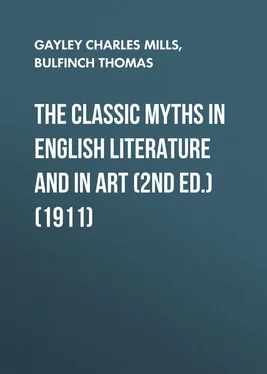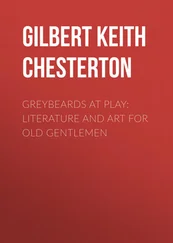Thomas Bulfinch - The Classic Myths in English Literature and in Art (2nd ed.) (1911)
Здесь есть возможность читать онлайн «Thomas Bulfinch - The Classic Myths in English Literature and in Art (2nd ed.) (1911)» — ознакомительный отрывок электронной книги совершенно бесплатно, а после прочтения отрывка купить полную версию. В некоторых случаях можно слушать аудио, скачать через торрент в формате fb2 и присутствует краткое содержание. Жанр: foreign_antique, foreign_prose, на английском языке. Описание произведения, (предисловие) а так же отзывы посетителей доступны на портале библиотеки ЛибКат.
- Название:The Classic Myths in English Literature and in Art (2nd ed.) (1911)
- Автор:
- Жанр:
- Год:неизвестен
- ISBN:нет данных
- Рейтинг книги:4 / 5. Голосов: 1
-
Избранное:Добавить в избранное
- Отзывы:
-
Ваша оценка:
- 80
- 1
- 2
- 3
- 4
- 5
The Classic Myths in English Literature and in Art (2nd ed.) (1911): краткое содержание, описание и аннотация
Предлагаем к чтению аннотацию, описание, краткое содержание или предисловие (зависит от того, что написал сам автор книги «The Classic Myths in English Literature and in Art (2nd ed.) (1911)»). Если вы не нашли необходимую информацию о книге — напишите в комментариях, мы постараемся отыскать её.
The Classic Myths in English Literature and in Art (2nd ed.) (1911) — читать онлайн ознакомительный отрывок
Ниже представлен текст книги, разбитый по страницам. Система сохранения места последней прочитанной страницы, позволяет с удобством читать онлайн бесплатно книгу «The Classic Myths in English Literature and in Art (2nd ed.) (1911)», без необходимости каждый раз заново искать на чём Вы остановились. Поставьте закладку, и сможете в любой момент перейти на страницу, на которой закончили чтение.
Интервал:
Закладка:
The musician's life was, however, not all harmony and happiness. Owing to the pride of his wife Niobe, daughter of King Tantalus, there befell him and his house a crushing calamity, which is narrated among the exploits of Apollo and Diana.
63. Jupiter, a Friend of Man.The kindly interest evinced by the Thunderer toward mortals is displayed in the story of Baucis and Philemon. Once on a time Jupiter, in human shape, visited the land of Phrygia, and with him Mercury, without his wings.
They presented themselves as weary travelers at many a door, seeking rest and shelter, but found all closed; for it was late, and the inhospitable inhabitants would not rouse themselves to open for their reception. At last a small thatched cottage received them, where Baucis, a pious old dame, and her husband Philemon had grown old together. Not ashamed of their poverty, they made it endurable by moderate desires and kind dispositions. When the two guests crossed the humble threshold and bowed their heads to pass under the low door, the old man placed a seat, on which Baucis, bustling and attentive, spread a cloth, and begged them to sit down. Then she raked out the coals from the ashes, kindled a fire, and prepared some pot-herbs and bacon for them. A beechen bowl was filled with warm water, that their guests might wash. While all was doing, they beguiled the time with conversation.
The old woman with trembling hand set the table. One leg was shorter than the rest, but a piece of slate put under restored the level. When it was steady she rubbed the table down with sweet-smelling herbs. Upon it she set some of chaste Minerva's olives, some cornel berries preserved in vinegar, and added radishes and cheese, with eggs lightly cooked in the ashes. The meal was served in earthen dishes; and an earthenware pitcher, with wooden cups, stood beside them. When all was ready the stew, smoking hot, was set on the table. Some wine, not of the oldest, was added, and for dessert, apples and wild honey.
Now while the repast proceeded, the old folks were astonished to see that the wine, as fast as it was poured out, renewed itself in the pitcher of its own accord. Struck with terror, Baucis and Philemon recognized their heavenly guests, fell on their knees, and with clasped hands implored forgiveness for their poor entertainment. There was an old goose, which they kept as the guardian of their humble cottage, and they bethought them to make this a sacrifice in honor of their guests. But the goose, too nimble for the old folk, with the aid of feet and wings eluded their pursuit and at last took shelter between the gods themselves. They forbade it to be slain, and spoke in these words: "We are gods. This inhospitable village shall pay the penalty of its impiety; you alone shall go free from the chastisement. Quit your house and come with us to the top of yonder hill." They hastened to obey. The country behind them was speedily sunk in a lake, only their own house left standing. While they gazed with wonder at the sight, that old house of theirs was changed. Columns took the place of the corner posts, the thatch grew yellow and appeared a gilded roof, the floors became marble, the doors were enriched with carving and ornaments of gold. Then spoke Jupiter in benignant accents: "Excellent old man, and woman worthy of such a husband, speak, tell us your wishes. What favor have you to ask of us?" Philemon took counsel with Baucis a few moments, then declared to the gods their common wish. "We ask to be priests and guardians of this thy temple, and that one and the same hour may take us both from life." Their prayer was granted. When they had attained a great age, as they stood one day before the steps of the sacred edifice and were telling the story of the place, Baucis saw Philemon begin to put forth leaves, and Philemon saw Baucis changing in like manner. While still they exchanged parting words, a leafy crown grew over their heads. "Farewell, dear spouse," they said together, and at the same moment the bark closed over their mouths. The Tyanean shepherd still shows the two trees, – an oak and a linden, standing side by side. 77 77 Ovid, Metam. 8, 620-724.
The story of Baucis and Philemon has been imitated by Swift in a burlesque style, the actors in the change being two wandering saints, and the house being changed into a church, of which Philemon is made the parson:
… They scarce had spoke, when, fair and soft,
The roof began to mount aloft;
Aloft rose every beam and rafter;
The heavy wall climbed slowly after.
The chimney widened and grew higher,
Became a steeple with a spire.
The kettle to the top was hoist,
And there stood fastened to a joist,
But with the upside down, to show
Its inclination for below;
In vain, for a superior force,
Applied at bottom, stops its course;
Doomed ever in suspense to dwell,
'Tis now no kettle, but a bell.
A wooden jack, which had almost
Lost by disuse the art to roast,
A sudden alteration feels,
Increased by new intestine wheels;
And, what exalts the wonder more,
The number made the motion slower;
The flier, though 't had leaden feet,
Turned round so quick you scarce could see 't;
But slackened by some secret power,
Now hardly moves an inch an hour.
The jack and chimney, near allied,
Had never left each other's side.
The chimney to a steeple grown,
The jack would not be left alone;
But up against the steeple reared,
Became a clock, and still adhered;
And still its love to household cares
By a shrill voice at noon declares,
Warning the cook-maid not to burn
That roast meat which it cannot turn.
The groaning chair began to crawl,
Like a huge snail, along the wall;
There stuck aloft in public view,
And with small change, a pulpit grew.
A bedstead of the antique mode,
Compact of timber many a load,
Such as our ancestors did use,
Was metamorphosed into pews,
Which still their ancient nature keep
By lodging folks disposed to sleep.
64. Juno's Best Gift.What the queen of heaven deemed the greatest blessing reserved for mortals is narrated in the beautiful myth of Biton and Cleobis. One Cydippe, an ancient priestess of the white-armed goddess, had desired to behold the famous new statue of Hera at Argos. Her sons testified their affection for their mother by yoking themselves, since no oxen were at hand, to her chariot, and so dragging her through heat and dust many a weary league till they reached the temple, where stood the gold and ivory masterwork of Polyclitus. With admiration the devoted priestess and her pious sons were received by the populace crowding round the statue. The priest officiating in the solemn rites thought meet that so reverend a worshiper should herself approach the goddess, – ay, should ask of Hera some blessing on her faithful sons:
… Slowly old Cydippe rose and cried:
"Hera, whose priestess I have been and am,
Virgin and matron, at whose angry eyes
Zeus trembles, and the windless plain of heaven
With hyperborean echoes rings and roars,
Remembering thy dread nuptials, a wise god,
Golden and white in thy new-carven shape,
Hear me! and grant for these my pious sons,
Who saw my tears, and wound their tender arms
Around me, and kissed me calm, and since no steer
Stayed in the byre, dragged out the chariot old,
And wore themselves the galling yoke, and brought
Their mother to the feast of her desire,
Grant them, O Hera, thy best gift of gifts!"
Whereat the statue from its jeweled eyes
Lightened, and thunder ran from cloud to cloud
In heaven, and the vast company was hushed.
But when they sought for Cleobis, behold,
He lay there still, and by his brother's side
Lay Biton, smiling through ambrosial curls,
And when the people touched them they were dead. 78 78 From The Sons of Cydippe, by Edmund Gosse in his On Viol and Flute.
Интервал:
Закладка:
Похожие книги на «The Classic Myths in English Literature and in Art (2nd ed.) (1911)»
Представляем Вашему вниманию похожие книги на «The Classic Myths in English Literature and in Art (2nd ed.) (1911)» списком для выбора. Мы отобрали схожую по названию и смыслу литературу в надежде предоставить читателям больше вариантов отыскать новые, интересные, ещё непрочитанные произведения.
Обсуждение, отзывы о книге «The Classic Myths in English Literature and in Art (2nd ed.) (1911)» и просто собственные мнения читателей. Оставьте ваши комментарии, напишите, что Вы думаете о произведении, его смысле или главных героях. Укажите что конкретно понравилось, а что нет, и почему Вы так считаете.












